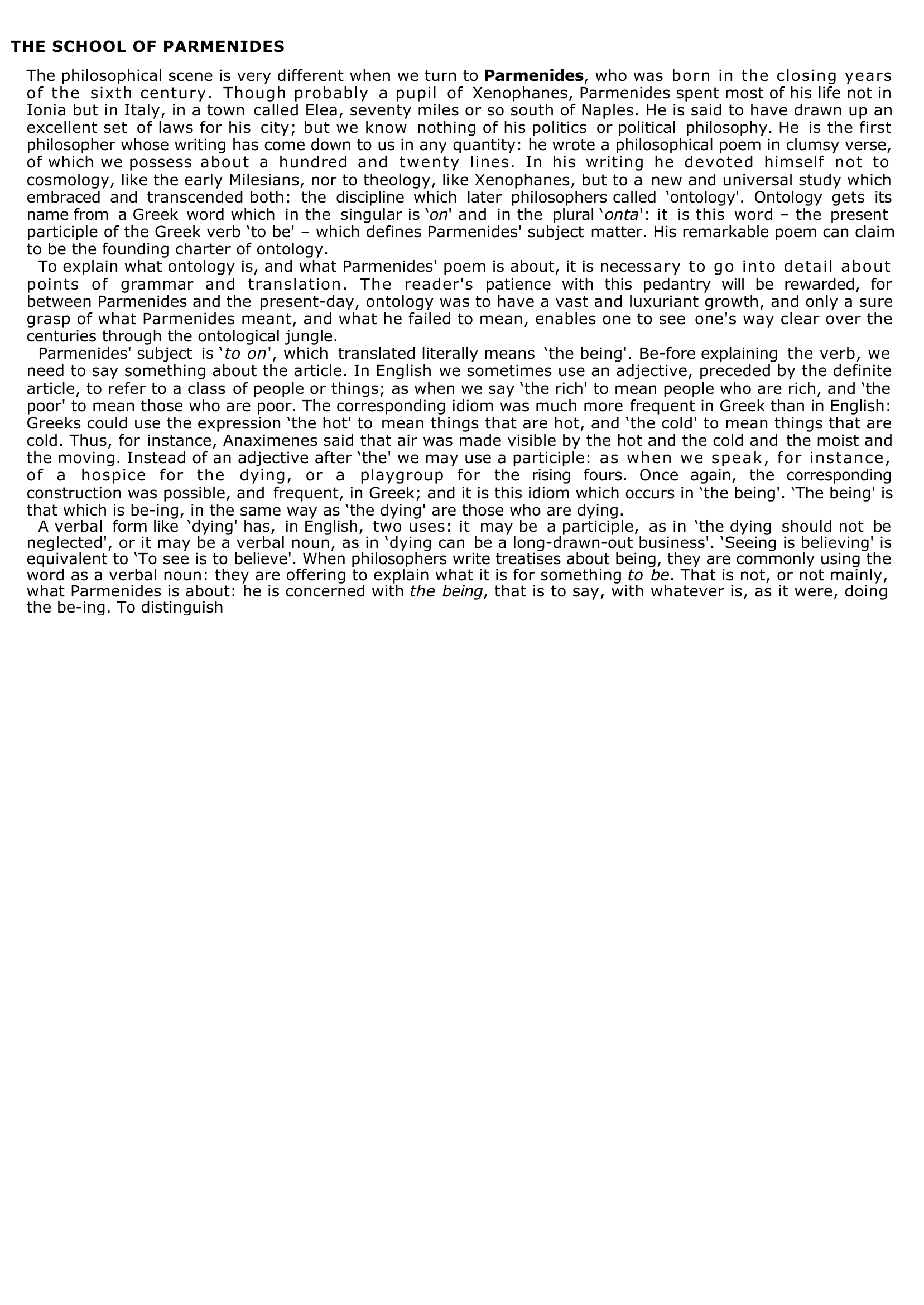Encyclopedia of Philosophy: THE SCHOOL OF PARMENIDES
Extrait du document
The philosophical scene is very different when we turn to Parmenides, who was born in the closing years of the sixth century. Though probably a pupil of Xenophanes, Parmenides spent most of his life not in Ionia but in Italy, in a town called Elea, seventy miles or so south of Naples. He is said to have drawn up an excellent set of laws for his city; but we know nothing of his politics or political philosophy. He is the first philosopher whose writing has come down to us in any quantity: he wrote a philosophical poem in clumsy verse, of which we possess about a hundred and twenty lines. In his writing he devoted himself not to cosmology, like the early Milesians, nor to theology, like Xenophanes, but to a new and universal study which embraced and transcended both: the discipline which later philosophers called ‘ontology’. Ontology gets its name from a Greek word which in the singular is ‘on’ and in the plural ‘onta’: it is this word – the present participle of the Greek verb ‘to be’ – which defines Parmenides’ subject matter. His remarkable poem can claim to be the founding charter of ontology.
«
THE SCHOOL OF PARMENIDES
The philosophical scene is very different when we turn to Parmenides, who was born in the closing years
of the sixth century.
Though probably a pupil of Xenophanes, Parmenides spent most of his life not in
Ionia but in Italy, in a town called Elea, seventy miles or so south of Naples.
He is said to have drawn up an
excellent set of laws for his city; but we know nothing of his politics or political philosophy.
He is the first
philosopher whose writing has come down to us in any quantity: he wrote a philosophical poem in clumsy verse,
of which we possess about a hundred and twenty lines.
In his writing he devoted himself not to
cosmology, like the early Milesians, nor to theology, like Xenophanes, but to a new and universal study which
embraced and transcended both: the discipline which later philosophers called ‘ontology'.
Ontology gets its
name from a Greek word which in the singular is ‘on' and in the plural ‘onta': it is this word – the present
participle of the Greek verb ‘to be' – which defines Parmenides' subject matter.
His remarkable poem can claim
to be the founding charter of ontology.
To explain what ontology is, and what Parmenides' poem is about, it is necessary to go into detail about
points of grammar and translation.
The reader's patience with this pedantry will be rewarded, for
between Parmenides and the present-day, ontology was to have a vast and luxuriant growth, and only a sure
grasp of what Parmenides meant, and what he failed to mean, enables one to see one's way clear over the
centuries through the ontological jungle.
Parmenides' subject is ‘to on', which translated literally means ‘the being'.
Be-fore explaining the verb, we
need to say something about the article.
In English we sometimes use an adjective, preceded by the definite
article, to refer to a class of people or things; as when we say ‘the rich' to mean people who are rich, and ‘the
poor' to mean those who are poor.
The corresponding idiom was much more frequent in Greek than in English:
Greeks could use the expression ‘the hot' to mean things that are hot, and ‘the cold' to mean things that are
cold.
Thus, for instance, Anaximenes said that air was made visible by the hot and the cold and the moist and
the moving.
Instead of an adjective after ‘the' we may use a participle: as when we speak, for instance,
of a hospice for the dying, or a playgroup for the rising fours.
Once again, the corresponding
construction was possible, and frequent, in Greek; and it is this idiom which occurs in ‘the being'.
‘The being' is
that which is be-ing, in the same way as ‘the dying' are those who are dying.
A verbal form like ‘dying' has, in English, two uses: it may be a participle, as in ‘the dying should not be
neglected', or it may be a verbal noun, as in ‘dying can be a long-drawn-out business'.
‘Seeing is believing' is
equivalent to ‘To see is to believe'.
When philosophers write treatises about being, they are commonly using the
word as a verbal noun: they are offering to explain what it is for something to be.
That is not, or not mainly,
what Parmenides is about: he is concerned with the being, that is to say, with whatever is, as it were, doing
the be-ing.
To distinguish.
»
↓↓↓ APERÇU DU DOCUMENT ↓↓↓
Liens utiles
- Encyclopedia of Philosophy: THE CRito of Plato
- Encyclopedia of Philosophy: Albert the Great
- Encyclopedia of Philosophy: THE THEORY OF IDEAS of PLATO
- Encyclopedia of Philosophy: THE EUTHYPHRO OF PLATO
- Encyclopedia of Philosophy: THE PHAEDo of Plato

































